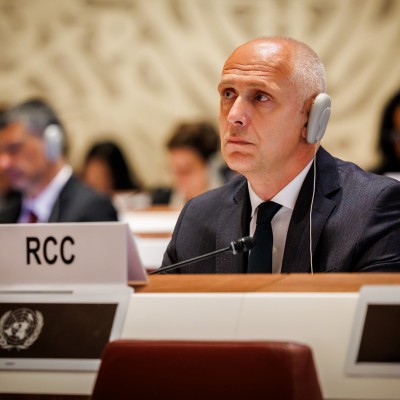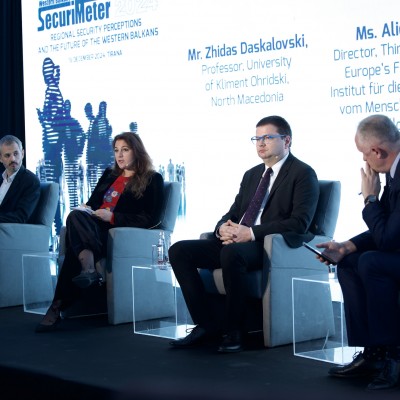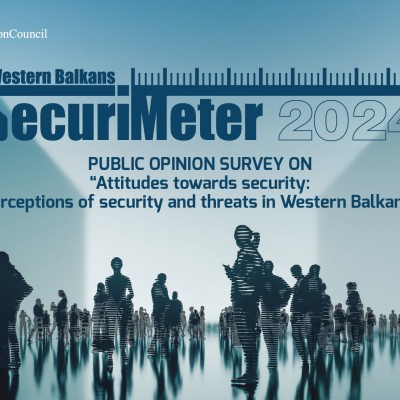South East European conference agrees in Bucharest today on the need to strengthen regional efforts in fighting corruption
21 May 2010

Senior RCC Expert on Justice and Home Affairs, Virgil Ivan-Cucu (first right), at the opening of a two-day regional South East European anti-corruption conference in Bucharest, Romania, 20-21 May 2010. (Photo RCC/Dinka Zivalj)
BUCHAREST/SARAJEVO – Participants of a two-day regional South East European (SEE) anti-corruption conference concluded in Bucharest today that countries in this part of Europe should develop more effective mechanisms to fight corruption.
The conclusion came following the results of a comprehensive study on integrity and resistance to corruption of the judicial systems in nine SEE countries (Albania, Bosnia and Herzegovina, Bulgaria, Croatia, The Former Yugoslav Republic of Macedonia, the Republic of Moldova, Montenegro, Romania and Serbia).
The document revealed that judicial system practitioners were satisfied with the activities of inter-governmental bodies, stressing that regional mechanisms could represent additional means to facilitate faster response in high level corruption cases.
The survey also found that one in three practitioners of the criminal judicial systems was aware of situations in which theirs or their colleagues’ decisions were subject of direct and deliberate influencing attempts. This perception seems to be largely generated by direct experience (33% of cases). The random distribution of cases is seen as an appropriate means to prevent political pressures and ensure professional dealings with high level corruption cases. The national legislation was generally assessed as good, but a necessity to fully implement it was emphasized.
In his opening remarks, Romanian Minister of Justice Catalin Predoiu underlined that corruption remained a serious challenge for the region, causing lack of trust among the citizens in the judicial system. He called for a better regional coordination in mending this situation, lending Romania’s full commitment to the process.
“No state can function properly if the citizens do not trust the judicial system. This is why, without prejudice to the independence of judiciary, measures are to be adopted to ensure that the system is free of corruption. This includes transparent exercise of public office, assets disclosure, and proper implementation of rules regarding the conflict of interest.”
The study highlighted the need to adopt and enhance strong protection mechanisms for the legal practitioners dealing with high level corruption cases, as well as for whistleblowers and witnesses. It recommended that the hiring/appointment system be based on relevant professional knowledge and track record, training is ensured on a continuous basis, and the promotion systems take into account performance indicators. Simultaneously, public awareness of negative effects of corruption and positive aspects of public integrity needs to be raised. Additionally, a regional policy on cooperation on the investigation, prosecution and trial of high level anti-corruption cases should be developed, along with a regional mechanism for assets recovery.
Senior Regional Cooperation Council Secretariat’s Expert on Justice and Home Affairs, Virgil Ivan-Cucu, pointed to several key preconditions for independent judiciary: guarantee of fair trial, law enforcement, and strict adherence to the separation of power and balance principle.
“In order to achieve sustainable effects of the fight against corruption, it is necessary to have adequate instruments in place, both in national justice systems, and within the international organizations framework. These should include: coherent and stable legislation, full implementation of international standards, and strong involvement of civil society.”
The study was conducted to identify common challenges in fighting high level corruption in criminal law proceedings, to improve efficiency and effectiveness of investigations, prosecution and trials; provide recommendations for improving national and regional law enforcement capacities; identify external vulnerabilities that impede the practitioners’ independence; strengthen integrity and resistance to corruption, adopt legal and governmental measures and bring national mechanisms in compliance with international and European standards; orient regional policies on fighting high level corruption and give coherency to legislative solutions.
The event was organized by the Regional Cooperation Council (RCC), the Regional Anticorruption Initiative (RAI), and the Transparency International (TI) Romania, in cooperation with the Romanian Chamber of Deputies and the Ministry of Justice, as well as the Ministry of Security of Bosnia and Herzegovina. It also marked the 10th anniversary of RAI.
The speakers also included Minister of Justice of the Republic of Moldova, Alexandru Tanase; Secretary General of Bosnia and Herzegovina’s Ministry of Security, Bakir Dautbašić; Vice-President of the Superior Council of Magistracy of Romania, Gratiana Isac; Executive Director of TI Romania, Victor Alistar; and RAI Chairperson, Vesna Ratkovic. Heads of anti-corruption structures in the ministries of justice and interior, public prosecutors’ offices and magistrates’ councils of SEE countries, regional organizations active in justice and home affairs, representatives of the EU, the UN and other relevant international organizations, professional associations and international experts took part in the conference.
Draft conclusions of the conference are available in English HERE, and in Bosnian HERE.
The full version of the integrity survey is available HERE.



